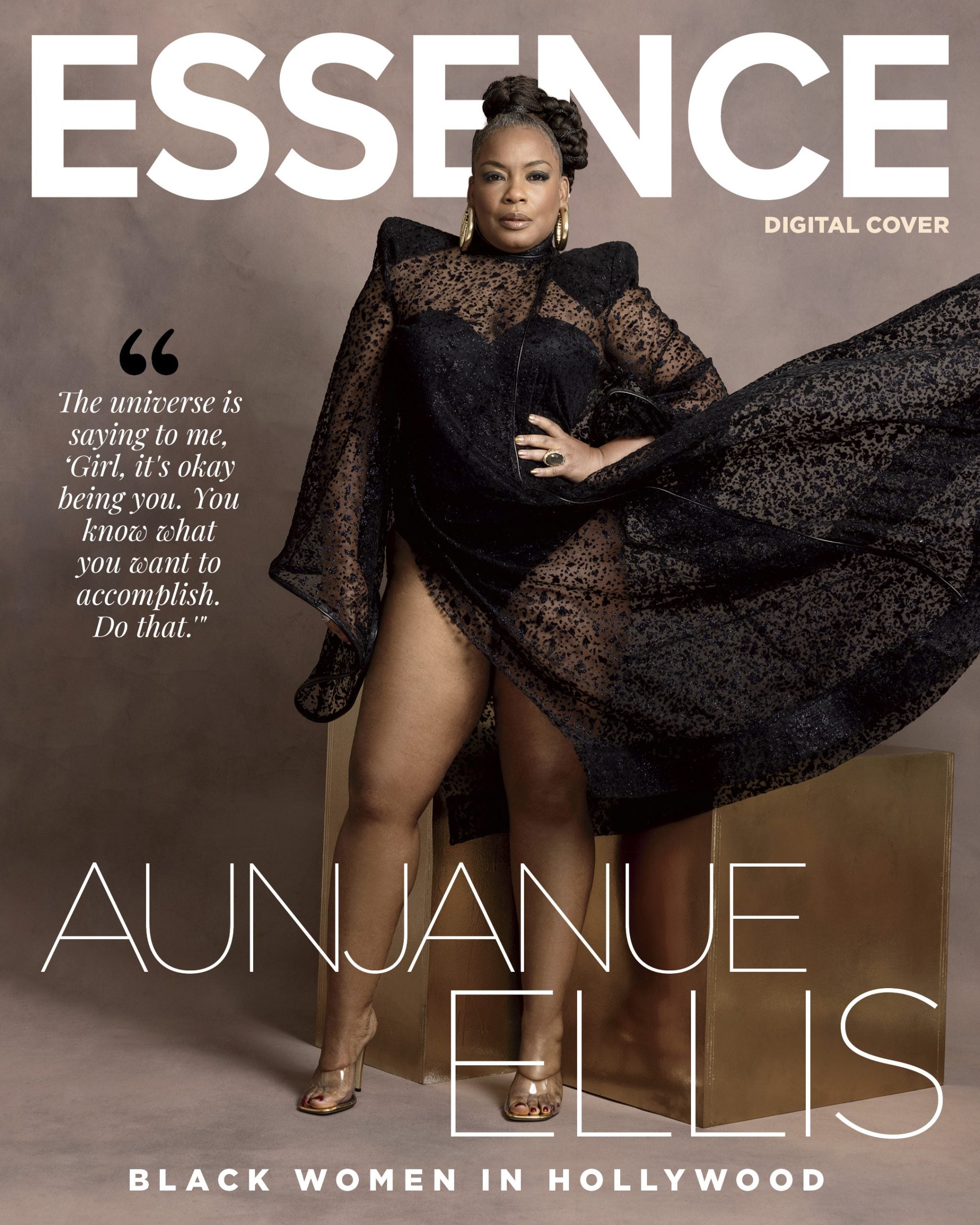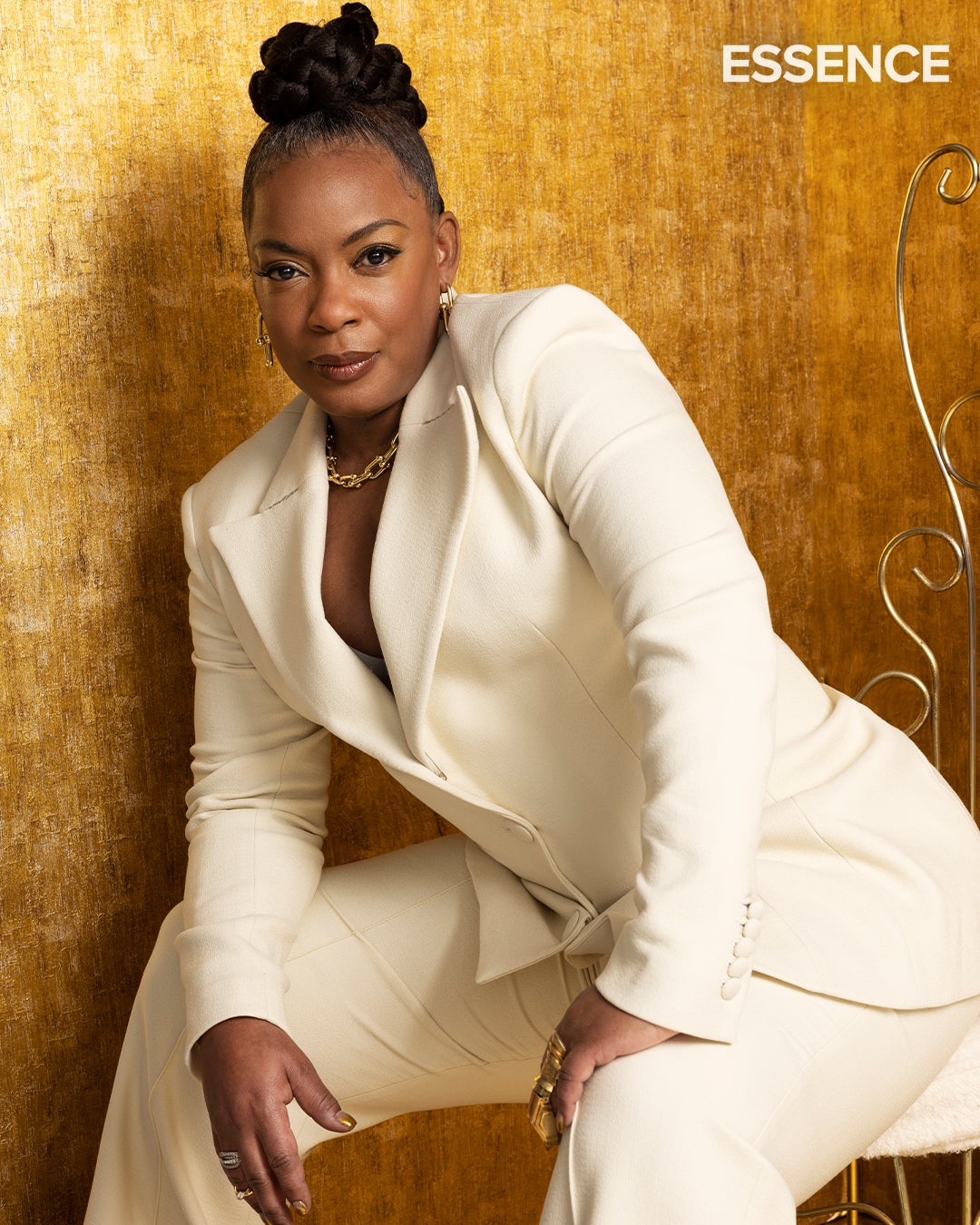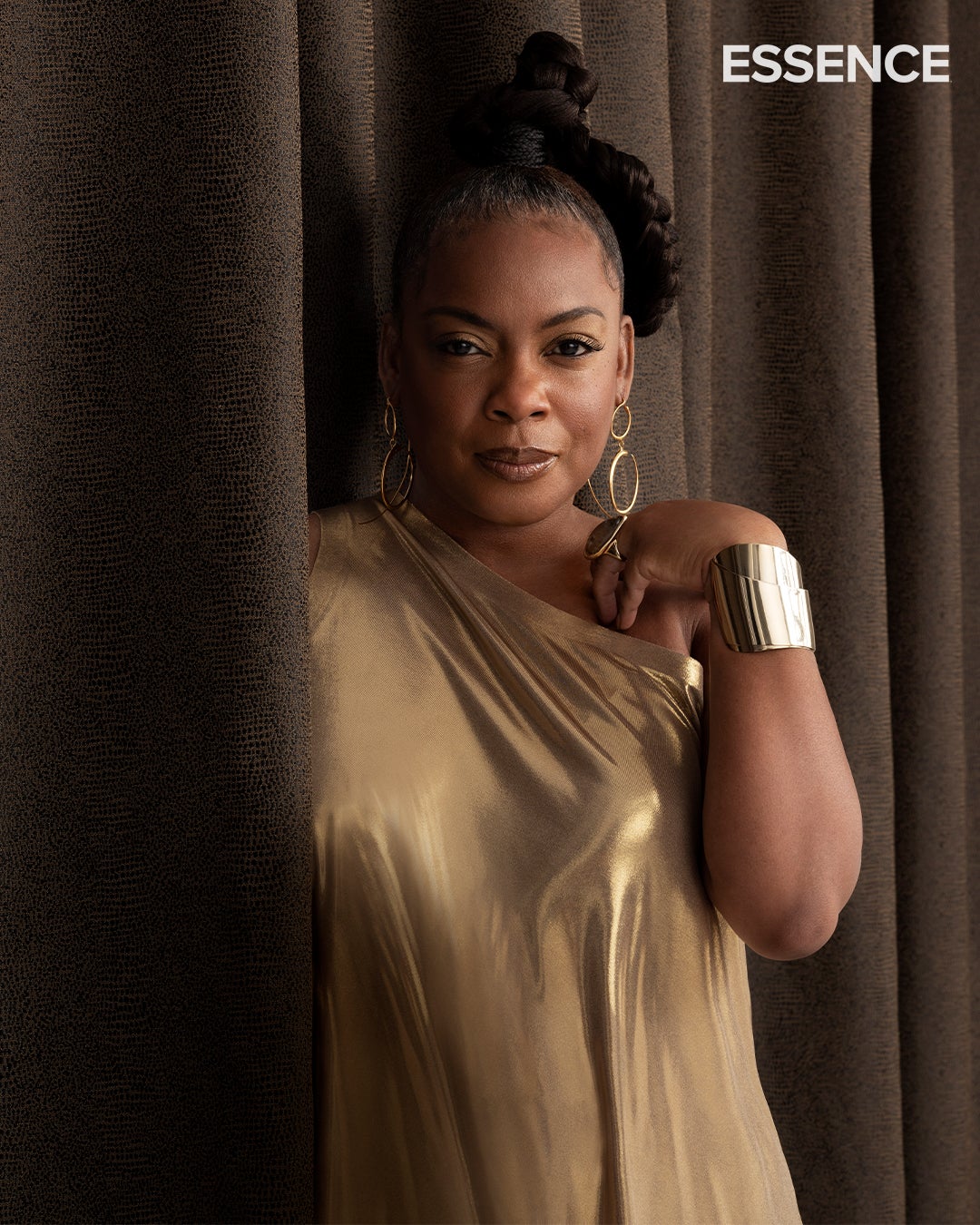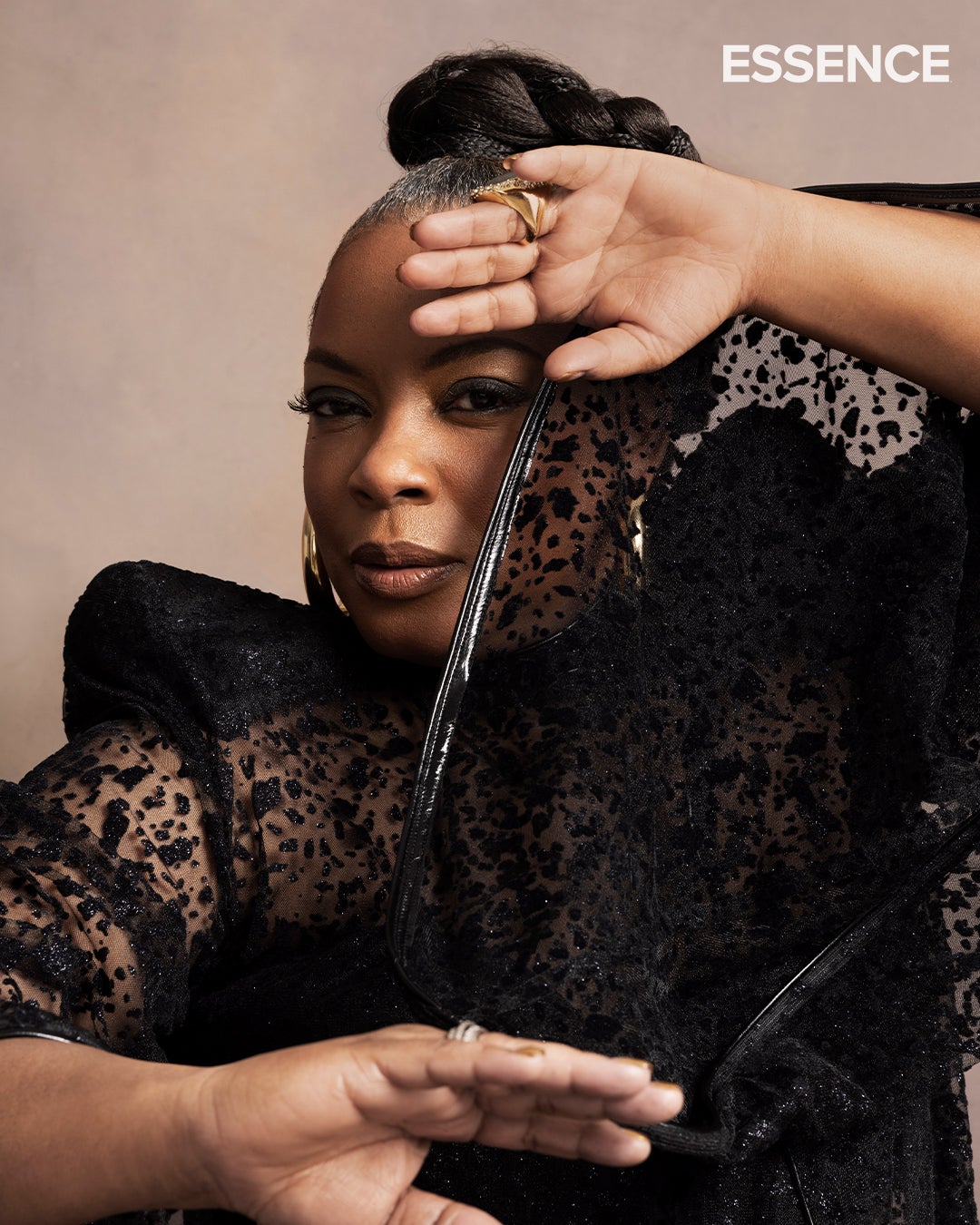Amid the intense buzz of awards season—a time when actors and actresses are packing their schedules with campaign events, screening Q&As and glitzy Hollywood parties to secure nominations, Aunjanue Ellis is at home in Mississippi. The actress, who gave one of the most talked-about performances in film in 2021, has been catching up on her reading, tending to her cats and staying close to her family. She’s happy. Instead of choosing to reside in Los Angeles or New York City, as most entertainers do, Ellis, who was raised in McComb, Mississippi, chose to return to the South 11 years ago. She says it’s the best decision she ever made.
“This is where I want to be,” Ellis says over Zoom. “I want to be down here in these woods.”

We talk just days before the actress receives her first Academy Award nomination, in the Best Supporting Actress category—for her turn as Oracene “Brandy” Price, mother of Venus and Serena Williams, alongside Will Smith in King Richard. The moment comes after more than 25 years of work, and it’s one Ellis once made peace with never having.
“A few years ago, I said, ‘These kinds of things will always elude me,’” recalls the ESSENCE Black Women in Hollywood honoree. “I wasn’t talking about how many people would know who I am—but just, really, getting awards, attention, all of that stuff. I just said, ‘That’s not for me.’”
After she accepted that possibility–-and the reality that she’s not interested in being a red-carpet darling—things changed. Ellis started to hear her name on nomination lists more often. She received a Critics’ Choice Television Award nomination for Best Actress in a Movie or Miniseries, for her role as Aminata Diallo in The Book of Negroes; and a Primetime Emmy Award nom for Outstanding Lead Actress in a Limited Series or Movie, for her portrayal of Sharonne Salaam in the Central Park Five miniseries When They See Us. For her part as Hippolyta Freeman, in the horror-meets–science fiction series Lovecraft Country, Ellis earned both a SAG Award nomination for Outstanding Performance by an Ensemble in a Drama Series and a Primetime Emmy nomination for Outstanding Supporting Actress in a Drama Series.
Her work in bringing the contributions of the Williams family matriarch to light, in a biopic centered around the patriarch, would make Ellis an Oscar contender. She wanted the role not for the chance to win gold but to honor two basic truths: The Williams sisters are American heroes; and their mother was far more involved in establishing their place in history than we realize.
“Finding out that this woman worked several jobs to keep food on the table—and at the same time was training herself to play tennis, so she could teach her girls how to play? Boss. Just boss,” Ellis says. “The consequence of that has changed the sport of tennis. Has changed sport, period.”

The picture Ellis paints of Price—devoted, patient, protective—moved not only critics but the Williams sisters, too.
“She is my mom,” says Serena Williams. “She did such a good job with everything. It just made me feel like she embraced that role to a whole new level. Living that life and being there, it was so great to see her embody my mom. I get chills thinking about it.”
Calling attention to the truth is what has kept Ellis committed to her craft. She was encouraged to pursue acting while studying at Tougaloo University, but upon graduating from New York University’s illustrious graduate drama program, she found herself going from gig to gig without passion or purpose.
“For a long time, I was flailing,” she says. Roles would take her from New York to California and back, allowing her to pay rent and help her family, but that was it. It wasn’t until she returned to Mississippi, and took stock of the world around her, that she found purpose in her work.
“I was taking care of someone in my family. I was back in Mississippi, back in the world of the Confederacy, and I was fighting constantly,” Ellis says. “I was fighting to keep my family member alive. I was fighting these Confederates. So what happened, in my blood and in my body, was a realization that with this acting thing, I may not be meant to be a celebrity red-carpet chick—but I can activate this thing in service of these battles that I’m fighting. And that’s what I did.”

Thinking back on that time, she adds, “When I was doing those red carpets, I was wearing dresses that said, ‘Take it down, President Obama,’ in reference to the Confederate flag. I was like, I don’t like being on red carpets, but if I’m going to be on a red carpet, I’m going to use it to get this message out here about this Confederate flag in Mississippi. It just changed my life completely.”
Truth-telling would also begin to inform the roles she went after, with Ellis focusing on bringing to life the stories of marginalized Black women who’ve been stifled or completely erased from history. It’s why she’s played women like Price, Salaam, gospel-music legend Mattie Moss Clark (in the Clark sisters biopic) and, most recently, civil rights leader Fannie Lou Hamer in an upcoming project. In the current climate, where truth is being suppressed among debates about critical race theory, Ellis is more determined than ever.
“If it’s not going to happen in the classrooms, we have to think of film and television as the classroom. That’s my mission,” she says. “I feel like the God I believe in put me on Earth to do this. That’s why I wake up in the morning: to do that.”

While delivering truth is the motivation, the acknowledgement Ellis is receiving this Oscar season is a nice bonus. She knows what it’s like to work hard on a project only to have no one respond to it upon release. And she’s had the experience of trying to be the “It girl” only for it not to go as planned. Still, bigger than any award in this moment is the opportunity to be a part of something dear to her that’s being lauded by critics and loved on by moviegoers. To work with Smith and uplift the young actresses who play their daughters in King Richard; and to celebrate the legacy of Price, Richard Williams, and their girls. It’s why Ellis says the biggest reward of all is not just to have this moment but to be her truest self in it.
“You want to do the whole,” she explains. “I felt like, Okay, well, I’m in these films and stuff. I need to be all this and be all that. But then I was like, No, I don’t. I don’t, because every time I feel like I make that effort to present in that way, it is an astronomical failure. I think that’s the universe saying to me, ‘Girl, it’s okay being you. You know what you want to do. You know what you want to accomplish. Do that. Put that energy in that place.’ So I’m good with that. I’m good with that.”
Fashion in order of appearance:
Dress: Hakan Akkaya, hakanakkaya.com.tr; Shoes: Giuseppe Zanotti Earthshine Plexy Mules $700, giuseppezanotti.com/us; Earrings: Jennifer Fisher 2″ Weightless Hollow Tube Hoops, jenniferfisherjewelry.com; Ring: Alexis Bittar Gold Large Infinity Ring $275, alexisbittar.com.
Suit: Christian Siriano Blazer & Trousers $1,600, $980, christiansiriano.com; Earrings, Necklace & Ring: Tiffany & Co. $3,400, $14,500, $5,800, tiffany.com; Ring: Lillian Shalom Hercules Gold Armor Ring $2,500, lillianshalom.com; Shoes: Jimmy Choo Gold Liquid Metal Leather Pumps $995, jimmychoo.com.
Top & Bottom: Norma Kamali One Shoulder Diagonal Tunic & High-Waist Elephant Pant $185, $195, normakamali.com; Bracelets & Rings: Alexis Bittar $195-$325, alexisbittar.com; Earrings: KHIRY Nandi Hoops $595, bergdorfgoodman.com.
Writer: Victoria Uwumarogie @ghostwritervic
Photographer: JD Barnes @jdthecombo
Hair: Jessica Taylor @jesstamazing
Makeup: Jessica Williams @jessica_theartist for @kbainc
Stylist: Scot Louie @scotlouie for the @thewallgroup
Stylist Assistant: Adrienne Anderson @treatment28
Fashion Market Editor: Marissa Pelly @marissa_pelly
Manicurist: Ashley Crowe for @kbainc
Prop Stylist: Melissa Elias @melissa.ann.elias
Producer: Wendy Correa @wendy_c_photo
Video: Jean Paul London @jeanlondondia
Editor: Antoinette Morris @mzlatreBWIH




